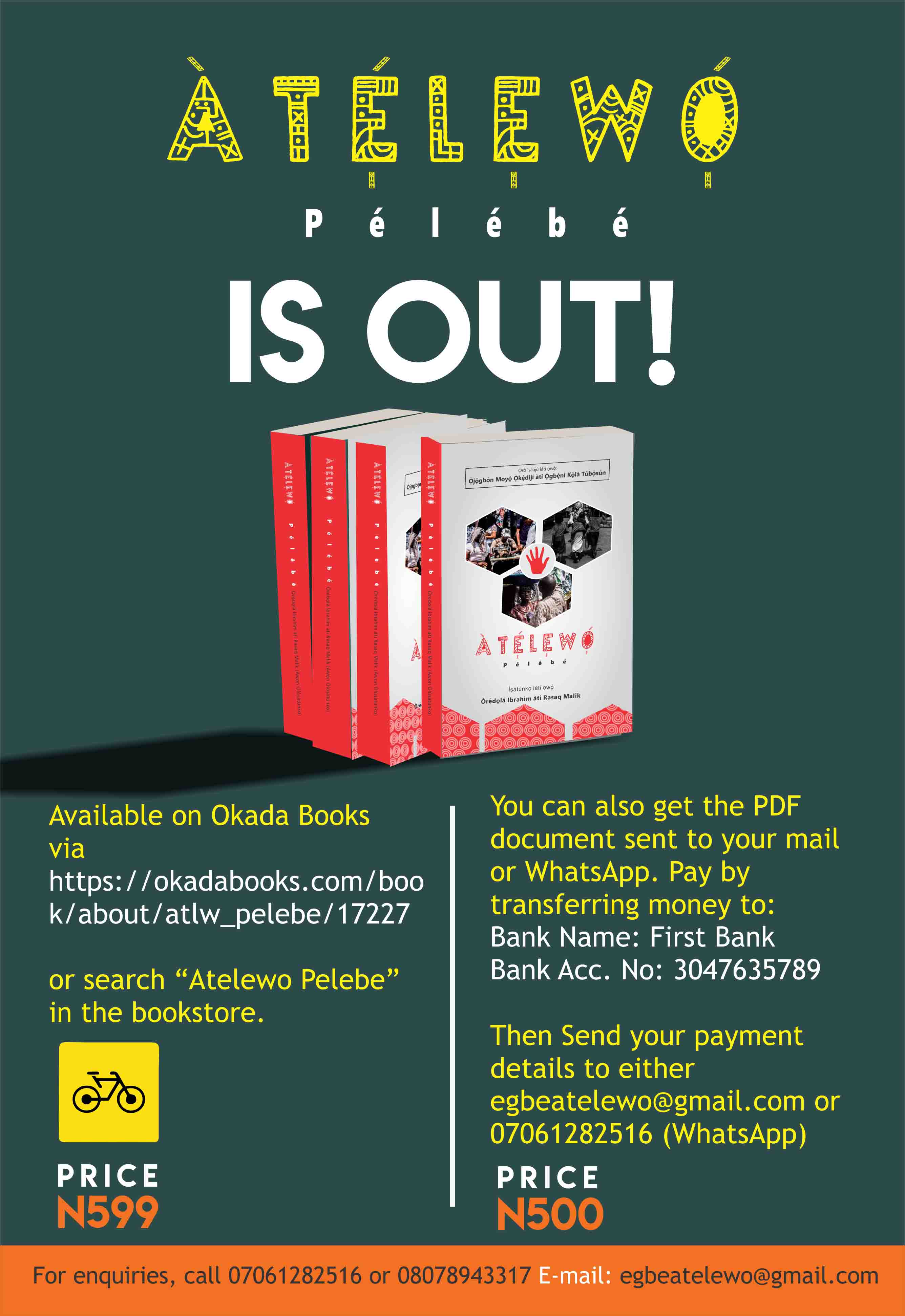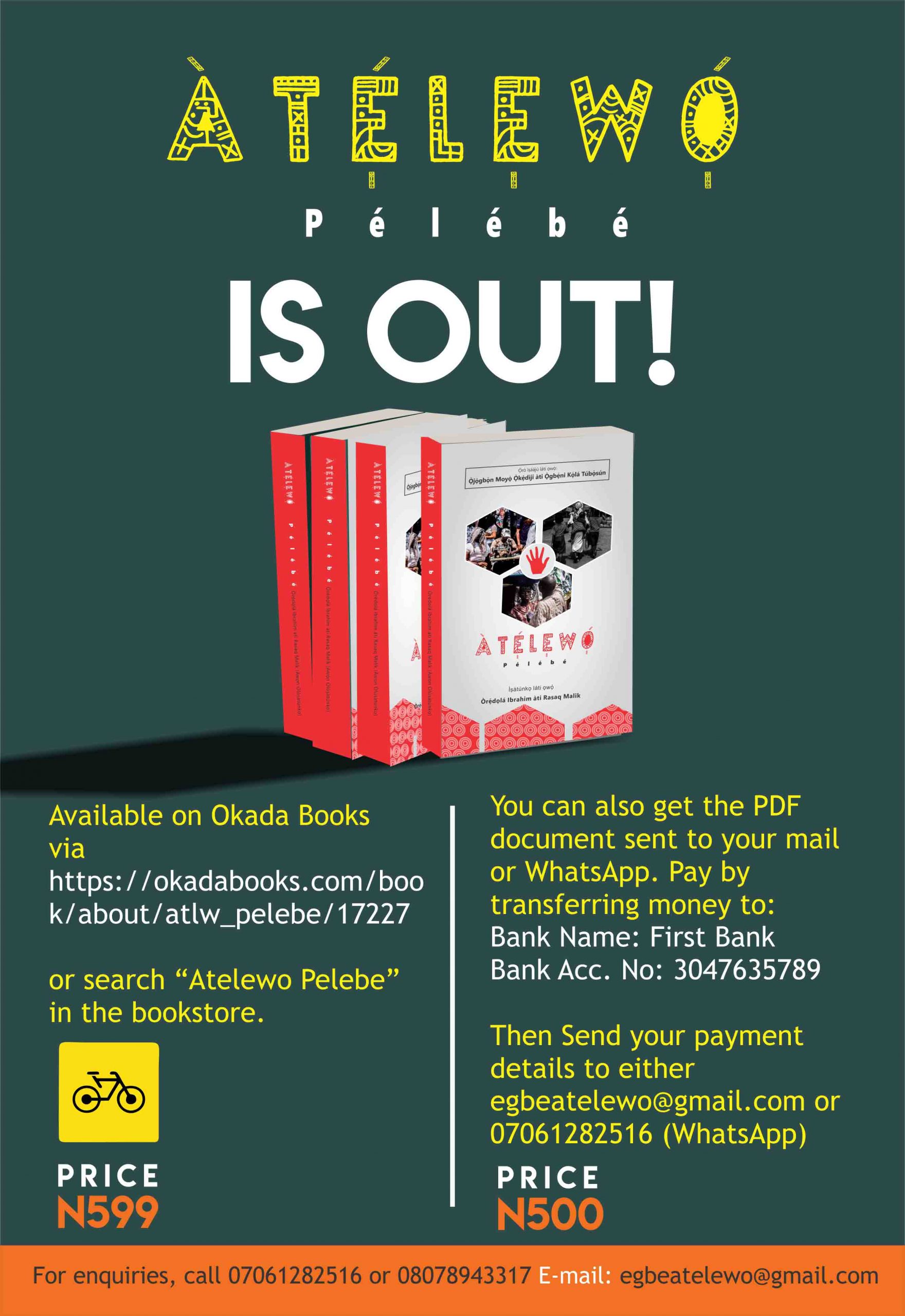Àtẹ́lẹwọ́ yọ wọ́n ṣe b’oṣù ló yọ
Àtẹ́lẹwọ́ yọ wọ́n ṣe b’oṣù ló yọ
Àṣẹ̀ṣẹ̀dé ọṣù, wọ́n lo ṣ’ara bíntín
Àtẹ́lẹwọ́ yọ wọ́n ṣe b’oṣù ló yọ

Inú wa dùn púpọ̀ láti rí ọjọ òní. Bééyàn bá sì gẹṣin nínú wa, geere báyìí ní yío màá lọ. Ìrìnàjò taa bẹ̀rẹ̀ láti bi oṣù mélo sẹ́yìn dé waa-sin-mi lónìí. Ọpẹ́ wa gbàngbà fún gbogbo àwọn tó kopa lónà kan àbí òmíì lori bi àlá yìí ṣe di ìmúṣẹ látorí àwọn olùkópa-òǹkọ̀wé, títí tó fi d’óri àwọn to fi ọ̀rọ̀ ìṣáájú yẹ́ wa sí, àwọn tó dìsáinì àwọn iṣẹ wa, olùyàwòrán wa, títí to fi d’órí ará, ọ̀rẹ́ àti ojúlùmọ̀ fún ìgbani nímọ̀ràn lori iṣẹ yìí. Adúpẹ púpọ̀. Bákan náà, a ki yín káàbọ̀ sí ibi ifilọ́lẹ̀ ránpẹ́ yìí.
ẸGBẸ́ ÀTẸ́LẸWỌ́ was founded in 2017 as a response to the myriads of challenges and threats facing the preservation and survival of the Yorùbá culture and language. Many people have lamented and written extensively about how Africans are gradually killing their culture and language as a result of excessive and unrestricted patronage of foreign ones and that of former colonial masters.
Apart from the fact that most people nowadays cannot even read in their indigenous languages, there is also a greater concern as regards the waning presence of quality literature materials in these languages. And this has no doubt impeded our ability to sufficiently and originally contribute to global discussions and solutions. For instance, just as we have robotics, we also have the concept of Ṣìgìdì in the Yorùbá culture as a programmable auto-bot capable of performing all of the functions of a robot – and even more! But lack of preservation of our indigenous knowledge and practices – of which language and literature plays a principal role – has not afforded us enough opportunities to harness our rich heritage.
Ṣùgbọ́n, kàkà kí a jùmọ̀ darapọ̀ mọ́n àwọn tí yio maa ráhùn nipa gbogbo àwọn ìpèníjà yìí, a ni ka fi ookan kún eeji ka kuku fi Ẹgbẹ́ Àtẹ́lẹwọ́ lélẹ lati ṣe aayan fun ọjọ ọla wa ati ti aṣa wa. Àtẹ́lẹwọ́ jẹ́ ẹgbẹ́ tí a dá sílẹ̀ t’ó wà fún ìràpadà àti ìgbélárugẹ àṣà Yorùbá. Iṣẹ́ Àtẹ́lẹwọ́ ni:
- Láti pèṣè ibi tí àwọn akẹ́kọ̀ ati ọ̀dọ́ leé máa kopa pẹlú oríṣiríṣi ẹya aṣa àti ìṣe Yorùbá látàrí ìdíje, ẹ̀kọ́, ìfọ̀rọ̀jomítoro ọ̀rọ̀ ati ṣi ṣe ìpàdé ìdanilẹ́kọ déédé.
- Láti ṣe àgbékalẹ̀ ibi tí a ti má ṣe àkọsílẹ̀ ati ìpamọ òye àṣà Yorùbá ìgbà àtẹ̀yìnwá nipa lilo ẹrọ oun ìmọ̀ ìgbàlódé.
- Tí ta àwọn èyàn jí sí ìfẹ́ lítíreṣọ̀ Yorùbá latàrí ṣiṣe ètò ìwé kíkà, jíjẹ kí ìwé lítíreṣọ̀ Yorùbá wà nlẹ̀ fún tità àti ṣíṣe àtẹ̀jade àwọn oǹkọ̀wé titun ní èdè Yorùbá.
Awa ti a jẹ́ akọni ẸGBẸ́ ÀTẸ́LẸWỌ́ jẹ́ mẹrin 😀 :
- Ọgbẹni Rasaq Malik (akẹ́ẹ̀kọ́ gboyè nínú ìmọ̀ èdè gẹ̀ẹ́sì, ilé-ìwé gíga fásitì Ìbàdàn)
- Omidan Owoyẹmi Ọpẹyẹmi (akéèkọ́ gboyè nínú èdè Yoruba, ilé-ìwé gíga fásitì Ọbáfẹmi Awólọ́wọ̀)
- Ọgbẹni Rahaman Abiọla Toheeb (akẹ́ẹ̀kọ́ gboyè nínú ìmọ̀ èdè gẹ̀ẹ́sì, ilé-ìwé gíga fásitì Ọbáfẹmi Awólọ́wọ̀)
- Ọgbẹni Ọrẹdọla Ibrahim (akẹ́ẹ̀kọ́ gboyè nínú ìmọ̀ òfin, ilé-ìwé gíga fásitì Ìbàdàn)
BUSINESS OF THE DAY: ÀTẸ́LẸWỌ́ PÉLÉBÉ
In furtherance of our stated objectives above, we started our first project – a collection of thoughts written in the Yoruba language. We went through a lot of challenges in putting the book together but we are happy it is finally here. And we are glad to inform you that we are launching the book, ÀTẸ́LẸWỌ́ PÉLÉBÉ. ÀTẸ́LẸWỌ́ PÉLÉBÉ is a collection of poems, short stories and articles written in the Yorùbá language from about 40 contributors within and outside Nigeria. The book showcases established and emerging names of writers of Yorùbá origin. The book was edited by the duo of Ọ̀rẹ́dọlá Ibrahim and Rasaq Malik.
The book has received accolades – within and outside the country – from people like Mr. Kọ́lá Túbọ̀sún (The founder of Yorubaname.com and the 2016 recipient of the Premio Ostana awards) who introduced the book and Professor Moyọ̀ Ọ̀kẹ́dìji from the University of Texas, Austin who wrote the foreword. Others who have praised the initiative include Saheed Adérìntọ́, Associate Professor from Western Carolina University, USA; Kọ̀ngọ́ Ọ̀rọ̀ (Graduate Assistant, University of Birmingham, Member (Yoruba Studies Association of Nigeria (YSAN) and Former Language Instructor, American Council on the Teaching of Foreign); Ààrẹ Ajíbọ́lá Ìshọ̀lá (President, Yoruba Students’ Association (2010-2011) and from many more.
With this publication, it is our hope to re-fill the dying passion for the Yoruba language amongst our youths, to reignite the discussion and attention surrounding the publication of Yoruba literature and lastly to inspire other youths like us that the future has already started and – like John Legend lamented in his song – “We are already late”. We want to inspire a renewed interest, focus, committment and contributions to the preservation and promotion of our indiginous culture, not just from Yorùbá youths but from others across different African cultures.
The book is currently available on Okadabooks.com and direct PDF purchase (to the mail or whatsApp). The hardcopy will hit the market next month.
YOU CAN GET YOUR COPY VIA ANY OF THE FOLLOWING CHANNELS:
- OKADABOOKS
You can either click this link https://okadabooks.com/book/about/atelewo_pelebe/17227 or search “ATELEWO PELEBE” in the bookstore on Okadabooks to download your copy for just N599.
- You can purchase a PDF copy of it that will be sent directly to your mail/WhatsApp for just N500.
Simply transfer N500 to the account below:
Bank Name: First Bank (Savings)
Bank Number: 3047635789
Send your payment details to egbeatelewo@gmail.com or 07061282516 (WhatsApp) and your copy will be sent immediately.
- Hard Copy coming later.
IT IS TIME TO LAUNCH US!
The idea is the same, you can launch us by buying the book for more than the quoted value. And we will also appreciate if you would support us to speed up the hardcopy production. Just comment how much you are launching us with and we will contact you to follow up on your pledge or you can send all your donations to (anonymous donations are also welcomed):
Bank Name: First Bank (Savings)
Bank Number: 3047635789
Do you know anyone that could be interested in launching us? Please help us tag them.
In addition to supporting the hardcopy production, all money realised will be expended towards the execution of our other programmes like organising Yorùbá books reading events, Yorùbá software hackathon and starting work on Volume 2 of ÀTẸ́LẸWỌ́ PÉLÉBÉ.
Ka tó ká ẹsẹ̀ gbogbo ẹ̀ kúò nílẹ̀, ó di dan dan kí a tún ṣe àfihàn, ki a sì tún dúpẹ́ púpọ̀ lọ́wọ àwọn wọ̀nyìí:
- Adéjìmí Amos -–gíráfísì dìsáínà wa -–fún iṣẹ́ takun takun lóri gbogbo èròjà alukoro wa àti ṣíṣe èpo ìwé náà lọ́ṣọ̀ọ́
- Rufai Sodiq – Ẹni tí ó ya gbogbo àwòrán tí o wà ní ojú èpo ìwé nàá.
- com àti gbogbo ìkọ̀ wọn fún ẹ̀rọ́ kíbọọdù ìṣàmì èdè Yorùbá ti wọ́n gbé jáde. Ọpẹ́lọpẹ́ ẹrọ yìí, ohun a n wí yìí kọ́ là bá maa wí.
Ni ìparí, àwa ti ṣe’wọ̀n tàa lè ṣe o. A kúkú mọ̀n pe díẹ̀ la lè ṣe nínú iṣẹ́ to wà nílẹ̀ yìí, bẹ̀ẹ̀ni, a sì tún mọ̀n pé dìẹ̀ ọ̀hún alára gan an, a kò le daa ṣé lái sí àtìlẹ́yìn yín. Awa láì s’ẹ́yin dà bí ọ̀kọ̀ tí ò l’épo, a dà bí gààrí tí ò ní ṣúgà, àti ọ̀bẹ̀ tí ò n’íyọ̀. Ẹ ma kúkú wò wá pé Ọmọdé ni wa, ẹ jọ̀wọ́ ẹ gbárùkù tì wá, ká jọ gbé ohun rere ṣe fún ìran Yorùbá. Àwọn Baba wa mọ’ni mọ’ni, àwọn Baba wa, mọ̀’yàn mọ̀’yàn, ìgbà tán lọ tán bọ̀, wọ́n kán s’orin:
Ènìyàn l’aṣo àwa
Ènìyàn l’aṣo àwa
Bí a bá bojú wẹ̀yìn,
Tí a r’ẹ́ni wa
Inú wa a dùn, ara wa a yá gágá
Ènìyàn l’aṣo àwa.
Ẹ ṣeun.
Ikọ̀ Àtẹ́lẹwọ́
1/26/2018
